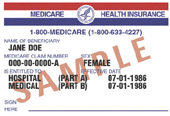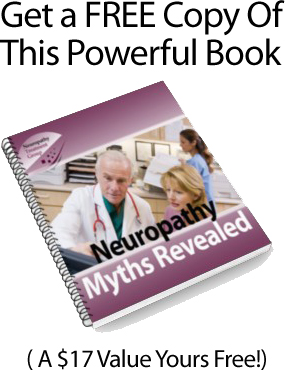HIV related Neuropathy
 There
are thousands of people who become infected with HIV each day. The virus
weakens the body’s immune system so it is weak or unable to defend the
body from illnesses that may include severe diarrhea, pneumonia,
tuberculosis, skin cancer, fever and skin infections. Due to the body’s
weakened immune system, people infected take longer or are unable to
fight off infections. In addition to these illnesses, patients often
develop neuropathy. HIV related neuropathy is a disease that affects the
nerves located outside the central nervous system (the spine). The
nerves affected are called peripheral nerves and run through the body
like a web, connecting all parts of the body to the brain and spine.
Peripheral Neuropathy leads to insensitivity, stiffness, and numbness in
the feet. These complications should be taken care of immediately to
prevent more serious problems such as the development of ulcers and
possibly even amputation. Image: Ambro / FreeDigitalPhotos.net There
are thousands of people who become infected with HIV each day. The virus
weakens the body’s immune system so it is weak or unable to defend the
body from illnesses that may include severe diarrhea, pneumonia,
tuberculosis, skin cancer, fever and skin infections. Due to the body’s
weakened immune system, people infected take longer or are unable to
fight off infections. In addition to these illnesses, patients often
develop neuropathy. HIV related neuropathy is a disease that affects the
nerves located outside the central nervous system (the spine). The
nerves affected are called peripheral nerves and run through the body
like a web, connecting all parts of the body to the brain and spine.
Peripheral Neuropathy leads to insensitivity, stiffness, and numbness in
the feet. These complications should be taken care of immediately to
prevent more serious problems such as the development of ulcers and
possibly even amputation. Image: Ambro / FreeDigitalPhotos.net
The ULTIMA 20 TENS in conjunction with
conductive socks, gloves or sleeves can help alleviate the pain caused
by Neuropathy.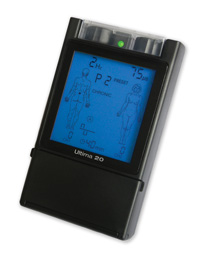 To see if you qualify for
ULTIMA 20 TENS and conductive garments simply fill out the intake form by
clicking on the link below. After you supply us with your information we will
verify your coverage and contact you regarding your order. Should we need to
contact your physician we will do that too on your behalf.
Click here to
download a brochure!

ARE YOU TIRED OF PAIN?
Neuropathy can cause insensitivity, numbness, heat, cold,
tingling; some have even described the pain as “walking on razor
blades”. People suffering from neuropathy can develop minor
cuts, scrapes, blisters, or pressure sores that they may not be
aware of due to their inability to sense the pain. Minor
injuries that are left untreated may cause complications and may
result in or lead to ulceration and possibly even amputation.
Neuropathy can also cause foot deformities such as Bunions,
Hammer Toes, Metatarsalgia, and Charcot Feet.
It is very important for people with HIV to take the necessary
precautions to prevent all foot-related injuries. Due to the
consequences of neuropathy, daily observation of the feet is
critical. By following the necessary preventative foot care
measures, you can reduce the risk of developing serious foot
conditions.
|
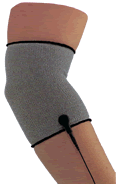 |
|
ULTIMA Sleeve |
|
The ULTIMA sleeve treats
Arthritis, Tendonitis, sprains and strains of the elbow. The
flexible mesh allows you to carry on with your day while the
electro-stimulation treats the pain. |
|
|
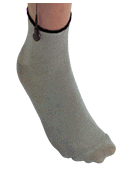 |
|
ULTIMA Sock |
|
The ULTIMA Sock is used to treat Neuropathy, and many other
conditions in your feet. Simply plug the socks in, sit back, and
enjoy the stimulating feeling. Most patients notice a difference
after the first session.
|
|
|
|
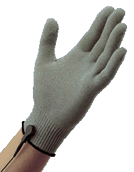 |
|
ULTIMA Glove |
|
The ULTIMA Glove works best to treat Arthritis,
Tendonitis, and sprains and strains. It even helped minimize
tremors in patients with Parkinson disease. Simply plug the gloves in,
sit back, and enjoy the stimulating feeling while watching TV.
|
|
Treatment and Prevention
People
with HIV are at high risk for developing neuropathy and other
serious foot complications.
While there is not cure for neuropathy, stimulating your nerves
can soothe irritated nerves, wake up numb nerves, and restore
the natural balance of your nervous system. The
ULTIMA 20 in conjunction with
conductive garments uses electrical impulses sent
through the skin to the nerves to modify your pain perception.
In most patients it is highly effective in reducing, even
eliminating the pain. In many patients the reduction or
elimination of pain lasts longer than the actual period of
stimulation. The ULTIMA 20 overrides the pain signal to the
brain by sending a comfortable electronic pulse, "tricking" the
brain into thinking there is no pain. This produces fast pain
relief, usually within a minute or two. You can control and
customize the intensity, pulse rate, and pulse width to find the
most effective and most comfortable setting.
Low Frequency: The lower frequencies, 2-5 Hz, are believed to cause the
body to react. The reaction creates natural painkillers, or endorphins. The
endorphins block the pain naturally and while popular, this isn't the usual
method of using TENS.
High Frequency: For more intense pain, higher frequencies, 90-130 Hz,
work to actually interrupt those pain signals being sent to the brain. This is
the most common use for the machine and while you start slow, it's not uncommon
to need to up the frequency to find the best block.
Learn more about Peripheral Neuropathy Pain here!
What's causing HIV related Neuropathy?
Approximately 30% of infected HIV patients develop a condition called
neuropathy.
The causes of Peripheral Neuropathy are still unidentified. Researchers suspect
that either HIV, or medications that are toxic to the nervous system (neurotoxic
drugs), or a combination of both may cause the damage to the peripheral nerves.
Neurotoxic drugs include many that are used to treat HIV or HIV-related
conditions. The most familiar are the HIV drugs commonly called the "d-drugs:"
-
d4T (Zerit)
-
ddC (Hivid)
-
ddI (Videx)
Additional neurotoxic drugs include:
-
INH (isonizaid)
-
Myambutol (ethambutol)
-
Flagyl (metronidazole)
-
Hydoxyurea
Causes, incidence, and risk factors
One set of peripheral nerves relays information from your
central nervous system to muscles and other organs. A second set
relays information from your skin, joints, and other organs back
to your central nervous system. Peripheral neuropathy means these nerves don’t work properly.
Peripheral neuropathy may involve damage to a single nerve or
nerve group, or it may affect multiple nerves (polyneuropathy).
There are many reasons for nerves to malfunction. In many cases,
no cause can be found.
Nerve damage may be
caused by:
•Diseases that run in families (hereditary disorders), such as:
•Charcot-Marie-Tooth disease
•Friedreich’s ataxia
•Diseases that affect the whole body (systemic or metabolic disorders)
such as:
•Cancer
•Diabetes
•diabetic neuropathy
•Dietary deficiencies (especially vitamin B12)
•Excessive alcohol use>
•Multiple myeloma
•Uremia (from kidney failure)
•Infections or inflammation, including:
•Guillain-Barre syndrome
•Hepatitis
•HIV
•Lyme disease
•Polyarthritis nodosa
•Rheumatoid arthritis
•Sarcoidosis
•Sjogren syndrome
•Syphilis
•Systemic lupus erythematosus
•Exposure to poisonous substances such as:
•Glue sniffing or inhaling other toxic compounds
•Heavy metals (lead, arsenic, and mercury are most common)
•Industrial chemicals — especially solvents
•Nitrous oxide
•Cisplatin
•Isoniazid
•Paclitaxel (Taxol)
•Pyridoxine (vitamin B6)
•Vincristine
Miscellaneous causes:
•Compression of a nerve by nearby body structures or by casts,
splints, braces, crutches, or other devices
•Decreased oxygen and blood flow (ischemia)
•Prolonged exposure to cold temperatures
•Prolonged pressure on a nerve (such as a long surgery)
•Trauma to a nerve
Symptoms
The symptoms depend on which type of nerve is affected. The
three main types of nerves are:
•Nerves that carry sensations (sensory)
•Nerves that control muscles (motor)
•Nerves that carry information to organs and glands (autonomic)
Neuropathy
may affect any one or a combination of all three
types of nerves. Symptoms depend on whether the condition
affects one nerve, several nerves, or the whole body. When the
whole body is affected, it is called polyneuropathy.
Longer nerves are more easily injured than shorter ones, so it
is common to have earlier or worse symptoms in the legs and feet
than in the hands and arms.
SENSATION CHANGES
•Burning sensations
•Changes in sensation
•Inability to determine joint position, which causes lack of
coordination
•Nerve pain
•Tingling or numbness
With many neuropathies, sensation changes begin in the toes and
move toward the center of the body. Other areas become involved
as the condition gets worse. Diabetes is a common cause of
sensory neuropathy.
Call your health care provider if you have symptoms of
peripheral neuropathy. In all cases, early diagnosis and
treatment increases the chance of controlling symptoms.
Nerve pain, such as that caused by peripheral neuropathy, can be
difficult to control. If your pain is severe, a pain specialist
may be able to suggest helpful approaches.
Emergency symptoms include:
•Difficulty breathing
•Difficulty swallowing
•Fainting
•Irregular or rapid heartbeat
|

*Generally, you pay 20% of the
Medicare-approved amount after you pay your Medicare Part B
deductible for the year ($162 in 2011). Medicare pays the other
80%. The Medicare-approved amount is the lower of the actual
charge for the item or the fee Medicare sets for the item.
However, the amount you pay may vary because Medicare pays for
different kinds of durable medical equipment in different ways.
You may be able to rent or buy the equipment. |
|




 There
are thousands of people who become infected with HIV each day. The virus
weakens the body’s immune system so it is weak or unable to defend the
body from illnesses that may include severe diarrhea, pneumonia,
tuberculosis, skin cancer, fever and skin infections. Due to the body’s
weakened immune system, people infected take longer or are unable to
fight off infections. In addition to these illnesses, patients often
develop neuropathy. HIV related neuropathy is a disease that affects the
nerves located outside the central nervous system (the spine). The
nerves affected are called peripheral nerves and run through the body
like a web, connecting all parts of the body to the brain and spine.
Peripheral Neuropathy leads to insensitivity, stiffness, and numbness in
the feet. These complications should be taken care of immediately to
prevent more serious problems such as the development of ulcers and
possibly even amputation.
There
are thousands of people who become infected with HIV each day. The virus
weakens the body’s immune system so it is weak or unable to defend the
body from illnesses that may include severe diarrhea, pneumonia,
tuberculosis, skin cancer, fever and skin infections. Due to the body’s
weakened immune system, people infected take longer or are unable to
fight off infections. In addition to these illnesses, patients often
develop neuropathy. HIV related neuropathy is a disease that affects the
nerves located outside the central nervous system (the spine). The
nerves affected are called peripheral nerves and run through the body
like a web, connecting all parts of the body to the brain and spine.
Peripheral Neuropathy leads to insensitivity, stiffness, and numbness in
the feet. These complications should be taken care of immediately to
prevent more serious problems such as the development of ulcers and
possibly even amputation.




